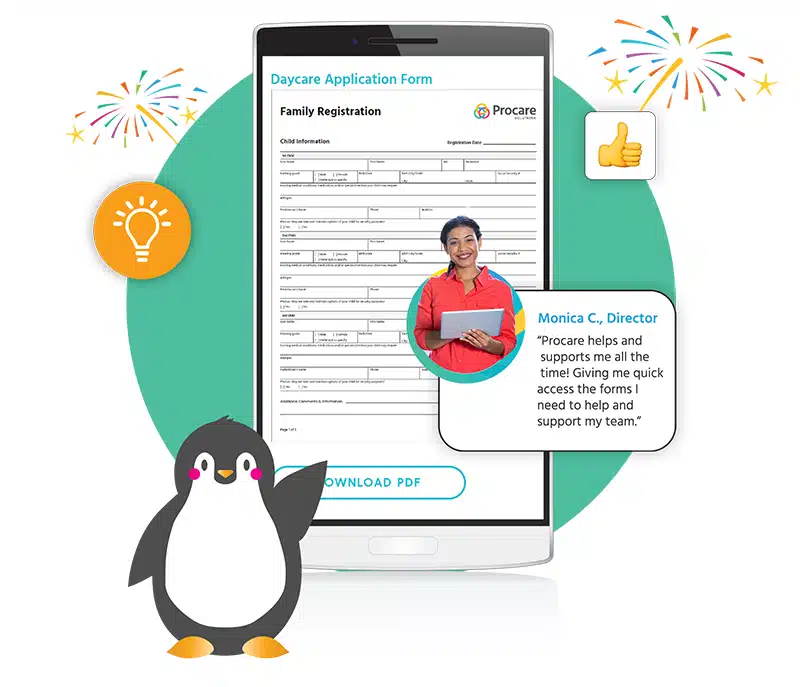SOLUTIONS
Procare for In-Home Daycare
Procare is an easy-to-use and affordable tool to help daycare owners maintain compliance and track child information and activities, all in a simple interface. Procare enables you to easily manage the children in your care, to communicate with families and provide digital payment options for families.
When you’re providing in-home daycare, you need a simple and cost-effective solution to help you communicate with families and enable parents to pay you. Procare Home is available for those smaller day care centers with fewer than 15 children.

End-to-End Capabilities
Procare saves you time and money by streamlining core administrative functions while raising the bar for family experiences with professional communications, an easy to access child care mobile app and the opportunity for real-time updates.
Our Procare Home solution is available for those smaller day care centers and in-home providers that want a simple and cost-effective solution for their operations. Procare Home is available to residential providers with fewer than 15 children and includes the following capabilities:
In-Home Daycare Management
- Attendance tracking
- Family and children data
- Scheduling
- Events calendar
- Immunization tracking
- Contactless check-in
- Meal plans & tracking
- Room management
- Standard reporting
Family Engagement
- Newsletters
- Family messaging
- Text messaging (limit 400/month)
- Activity sharing
- Child care mobile app
- eDocuments
Payments*
- Online payments
- Mobile payments
Support
- Support center – videos, articles, help guides
- Live chat
*Our Procare in-home solution is available with Stripe as a payment processor. To take advantage of Procare’s proprietary payment processing capability, providers will need to upgrade to our Essentials package solution. Learn more about our proprietary Tuition Express platform.
Procare In-Home Daycare Pricing
We understand that smaller centers and in-home daycare providers are operating on a tight budget, and that is why we provide all these features for the affordable price of just $25 per month. Let us handle the business of child care so you can get back to caring for your children.

Get Started with Home Daycare Management Software

Signing up for Procare is easy and stress-free. Click here to sign up for a 14-day free trial of our Procare home daycare management software. You will have access to all the innovative features Procare has to offer without any obligation. When your 14-day free trial ends, you will be prompted to enter your credit card information in a secure form to continue with Procare. This allows you to try Procare at no cost and see how Procare can drastically reduce the administrative tasks of caring for children in your home.
Why Procare
Proven in Child Care
For over 30 years, daycare owners have looked to Procare to provide real-time information for making critical decisions, maintaining compliance with local and state regulations and adhering to business best practices.
End-to-End Capabilities
Procare saves you time and money by streamlining core administrative functions while raising the bar for the parent experience with professional communications, easy to access portals and the opportunity for real-time updates.
Equipped for Any Center
Priced and sized right, our in-home daycare solution supports residential-based daycares for up to 15 children. We handle the business administration so you can focus on what matters most – better outcomes for the children in your care.
Designed Specifically for Child Care Professionals
Procare understands the importance of your role in managing an in-home daycare. Tracking child attendance, having easy access to family information, handling schedules, keeping records, communicating with parents, billing and processing payments are administrative tasks that we do for you so you can spend more time with the children in your care.

ZERO
contracts, set-up fees, per-child charges and more!
2M+
child care mobile app downloads
Over 70%
of North America’s largest for-profit child care organizations use Procare
Resources for New Providers
Understanding State Requirements for Daycare Centers
- Visit the Child Care Technical Assistance Network to search for child care licensing regulations in your state.
- View state-by-state child care licensing requirements
Helpful Resources for Starting an In-Home Daycare
- Full Guide to Starting Your In-Home Daycare
- How Much Does In-Home Daycare Cost?
- In-Home Daycare Contract and Other Resources
- 7 Types of Child Care Programs You Can Start
Free Daycare Forms
